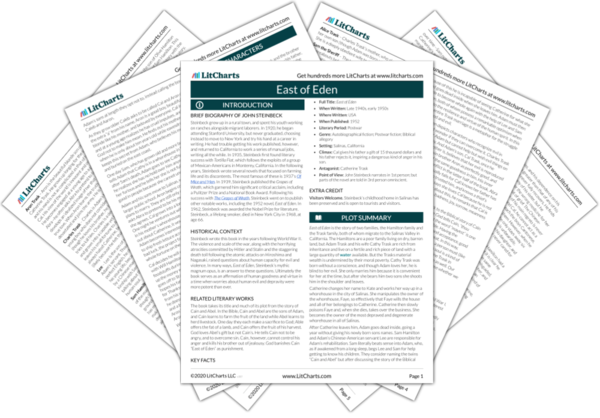Summary
Analysis
The narrator muses about the nature of Cathy’s monstrosity. He notes it is easy to say that Cathy was bad, but difficult to say why, for Cathy never had a common language with anyone.
The narrator is making an important point here about the nature of human understanding: understanding requires a common language. In other words, we can only understand that which we can apply to ourselves, to our own story.
Themes
Cathy’s pregnancy advances quickly—he grows unusually large in the stomach for a woman her size. She sits quietly watching the flurry of activity around her. One day while Sam is drilling, Lee comes running outside and insists that Sam come inside to help—Cathy has gone into labor and Adam is losing his mind with excitement, fear, and worry. Sam tells Lee to calm down, and as they head to the house, they talk about Cathy. Lee explains that he’s witnessed births before, but that Cathy’s labor is strange, and if he were more old fashioned, he might call her a demon. Just before Sam goes into the house, Lee tells him he’s been translating old Chinese poetry into English, and offers these translations to Sam to read. Sam says he would love to look at them.
This scene nicely illustrates the narrator’s point about language above. Lee cannot find a word to describe Cathy—if he were more “old fashioned” he would call her a demon, but we get the sense that he finds this word inadequate. Cathy is simultaneously familiar and unfamiliar, for she is part—but only part—human. Lee’s dexterity with language, his ability to translate ideas across cultures (like translating Chinese poetry), is a key part of his complex identity and of his understanding that storytelling is universal.
Themes
Sam goes into the bedroom and Cathy looks furious. He manages to get her to tell him how far apart her contractions are, though it is clear she hates Sam and resents his help. When the next contraction strikes she bites down on Sam’s hand so hard he knows he will not be able to use it for weeks. Sam pours whiskey on the wound, and the baby is ready to be delivered. It is a boy—Sam swaddles the baby and tells Adam, who looks queasy. Sam asks for Lee, who comes in to help him clean up. Suddenly Sam sees that a second baby is coming. Sam delivers the second child as quickly as the first, and announces to Cathy that she has two sons. Cathy refuses to see them. Sam hears the hatred in her tone and tells Cathy he doesn’t like her. Cathy ignores him and asks for Adam.
Here we see Cathy’s monstrous behavior clearly on display. Her biting of Sam is animalistic and barbaric. What’s more, her unwillingness to hold or even acknowledge her sons is detestable to Sam, who can no longer disguise his feelings for her. The birth of two healthy sons despite the conflicts and negativity that surrounds them is once again an affirmation of humanity’s resilience in the face of hatred, anger, violence, and evil.
Themes
Lee tries to clean up Sam’s wound, and they talk about Cathy. Sam says he “feels a dreadfulness coming” and Lee agrees, but both men worry they are being stupid and superstitious. Sam decides he will send for Liza to help with the twins, and if she notices anything about Cathy then they have real cause to worry.
Lee and Sam feel foolish for being as afraid as they are—their fear is irrational. But he novel is in many ways an affirmation of the value and importance of the irrational; not all understanding comes from rational thought.
Themes
Get the entire East of Eden LitChart as a printable PDF.

Liza arrives a few hours later and stays for a week, cleaning the house, washing the children and helping Adam adjust. When she returns, Sam asks her how it went. Liza remarks that, though she can find no fault with Cathy, she dislikes her. Sam notes that Cathy has put a spell on Adam—that he can’t leave her side, and has barely given a thought to the twins.
Liza also possesses the same irrational distrust of Catherine. Adam’s inability to leave her side shows again that he is not seeing the real Cathy. His unflinching belief in her goodness threatens to destroy his entire family.
Themes
Cathy rests for a week, until one day Adam enters her room to find her holding a suitcase and wearing traveling clothes. She announces that she is leaving. Adam doesn’t understand. She repeats herself, and when Adam tries to stop her, she pulls out a gun and shoots him in the shoulder. As he lies on the floor, injured, he hears her footsteps on the porch, and hears the crying of his sons; he’s forgotten to feed them.
Finally Cathy makes her escape. Adam is caught entirely off guard, though she made her intentions quite clear. As Adam lies bleeding on the floor, the cries of his sons reveal his neglect: by believing blindly in the goodness of his wife he has failed to be a good father.
Themes












